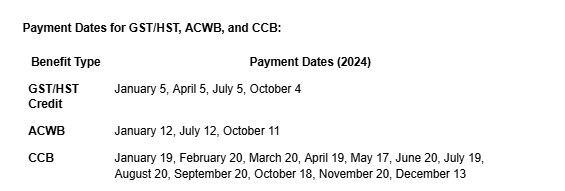For Canadian Small Business Only
Essential Tax Benefit Payment Dates and Deadlines for 2024
The Rising Cost of Living: How Young Canadians Can Benefit from the Government's Affordability Plan
Gen Z and millennials are feeling the strain of rising living costs, but there's good news—Canada’s government has introduced an Affordability Plan to provide financial relief through a variety of benefit programs. If you qualify, you’ll receive direct affordability payments.
Keeping track of these payments can be challenging (we get it—you'd rather be catching up on your favorite show than searching for government payout dates). But don’t worry, we’ve got you covered! Below is a breakdown of the most important federal and provincial benefits you can take advantage of, along with the key payment dates. Be sure to mark your calendar!

Federal Benefits for All Canadians
The great thing about federal benefit programs is that they are available to eligible individuals no matter where you live in Canada. Most benefits can be accessed when you file your tax return.
Goods and Services Tax/Harmonized Sales Tax (GST/HST) Credit
This credit helps low-to-moderate income individuals and families offset the cost of GST or HST. Payments are tax-free and made quarterly. Simply file your tax return to be considered.
Advanced Canada Workers Benefit (ACWB)
As of July 2023, the Canada Workers Benefit (CWB) now includes advance payments, providing 50% of the benefit over three installments. This program supports low-income individuals and families and can be claimed when you file your taxes.
Canada Child Benefit (CCB)
The CCB provides tax-free monthly payments to help families with the costs of raising children under 18. It also includes the Child Disability Benefit. You can apply for this benefit when your child is born or if you have a custody arrangement, typically through CRA’s My Account.

Support for Veterans and Seniors
Veteran Disability Pension
This benefit supports veterans with disabilities resulting from their service. You can apply through My VAC Account.
Canada Pension Plan (CPP)
CPP provides a taxable monthly benefit during retirement. While retirement may seem far off, knowing what your CPP could be is helpful. The maximum payout for someone turning 65 in 2023 is $1,306.57 per month. You can apply through My Service Canada Account (MSCA).
Old Age Security (OAS)
OAS offers a monthly pension to those aged 65 and older. Most people are automatically enrolled, but if you aren’t, you can apply through MSCA. The average OAS payment is $707.68 for those aged 65-74 and $778.45 for those 75+.

Provincial Benefits
In addition to federal benefits, there are provincial programs designed to support Canadians.
Climate Action Incentive Payment (CAIP)
CAIP provides tax-free payments to offset federal pollution pricing. It includes extra amounts for rural residents. Residents of Alberta, Saskatchewan, Manitoba, Ontario, and the Atlantic provinces may qualify.
Ontario Trillium Benefit (OTB)
The OTB helps low-income families with energy, sales tax, and property tax costs. You can apply by completing the ON-BEN application form along with your tax return.
Alberta Child and Family Benefit (ACFB)
The ACFB provides tax-free payments to help low-to-middle-income families with children. Eligibility is automatically assessed when you file your taxes.

Save the Dates! Be sure to mark your calendar for these important benefit payment dates. Staying on top of them means you can better manage your finances throughout the year!
Key Points to Remember
- Claim what’s available: Don’t miss out on federal and provincial benefits.
- Payment schedules: Most payments are distributed monthly or quarterly.
- File your taxes: To qualify, ensure your tax return is filed on time.










Bring your books up to date
CONTACT US TODAY
Contact Number

